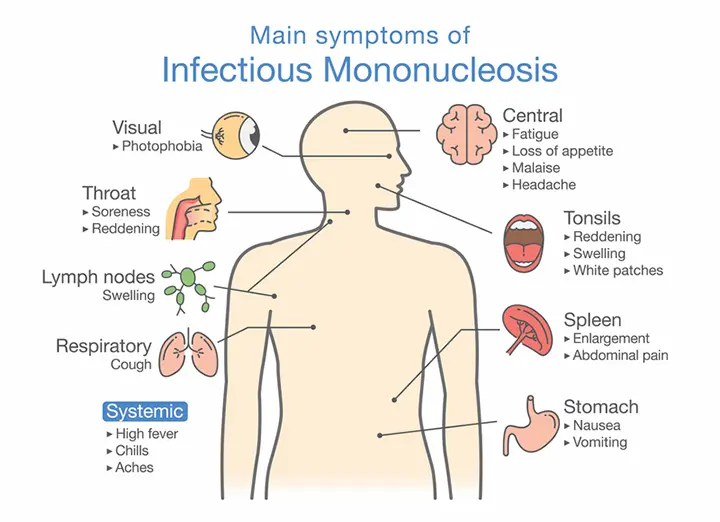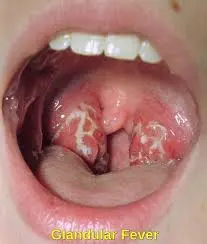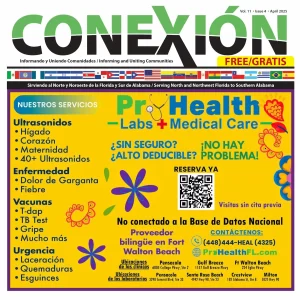Eliana is so sick and tired. Mononucleosis.
Eliana is a young adolescent of 14 years. She comes home one day complaining to her parents that she has headache, fever, and very bad sore throat. Her mother tells her to take some Tylenol and to go to bed. The next morning when Eliana awakes she can barely swallow and feels much worse. Eliana is taken to the clinic where she is examined and found to have severe pharyngitis and swollen cervical lymph nodes. She is tested for Streptococcus and is positive. Eliana is started on penicillin based antibiotics and sent home.

Eliana appears to get better but a week later she continues to have swollen glands and sore throat. She now has extreme fatigue and has some left upper quadrant abdominal pain. She appears miserable and her parents again bring her to the clinic. Her physical exam again demonstrates exudative tonsils with swollen lymph glands. Today however her spleen feels enlarged. Eliana has blood obtained and is tested for Mononucleosis or Epstein Barr virus. Her results are positive for mono.
Eliana has Infectious mononucleosis (mono) also called the kissing disease. The virus is spread via saliva so it can be spread by kissing, coughing, sneezing, or sharing food or water. Most commonly seen in adolescents or young adults
Mononucleosis Symptoms

These include fatigue, sore throat, strep throat not improved with antibiotics, fever, swollen lymph glands in neck and axilla, headache, rash, and enlarged spleen. Signs and symptoms such as a fever and sore throat improve within a few weeks, but fatigue, enlarged lymph nodes and a swollen spleen may last for a few weeks longer.
Complications of mononucleosis:
Enlarged spleen Mononucleosis may cause enlargement of the spleen.
Hepatitis. You may experience mild liver inflammation (hepatitis).
Jaundice. A yellowing of your skin and the whites of your eyes (jaundice) also occurs occasionally.
Anemia — a decrease in red blood cells and in hemoglobin.
Thrombocytopenia — low count of platelets.
Heart problems — an inflammation of the heart muscle (myocarditis)
Complications involving the nervous system — meningitis, encephalitis and Guillain-Barre syndrome
Swollen tonsils — which can block breathing
Treatment –
Antibiotics do not work. There is no specific treatment excepts rest, good nutrition, and staying very well hydrated. Use pain relievers such as acetaminophen or ibuprofen as needed to relieve pain or a fever.
DO not use aspirin!
Gargle with salt water. Drink plenty of water and fruit juices. Avoid contact sports and wait to return to sports and other activities for at least a month after spleen size has returned to normal.
Most signs and symptoms of mononucleosis ease within a few weeks, but it may be two to three months before you feel completely normal. The more rest you get, the sooner you should recover. Returning to your usual schedule too soon can increase the risk of a relapse.
To avoid the risk of rupturing your spleen, wait at least one month before returning to vigorous activities, heavy lifting, roughhousing or contact sports. Rupture of the spleen results in severe bleeding and is a medical emergency.
Prevention –
Mononucleosis is spread through saliva. If you’re infected, you can help prevent spreading the virus to others by not kissing them and by not sharing food, dishes, glasses and utensils until several days after your fever has subsided and even longer, if possible. The Epstein-Barr virus may persist in your saliva for months after the infection. No vaccine exists to prevent mononucleosis.



